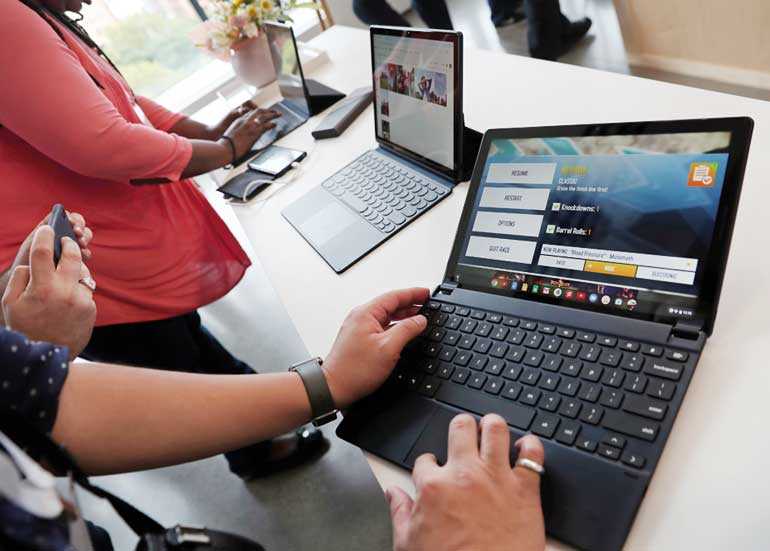Wednesday Feb 18, 2026
Wednesday Feb 18, 2026
Monday, 15 October 2018 01:22 - - {{hitsCtrl.values.hits}}
San Francisco (Reuters): Alphabet Inc.’s Google last week unveiled the third edition of its Pixel smartphone, a Google Home smart speaker with a display and its first tablet computer as it makes a come-from-behind push into hardware.
The company’s Android software has gone from being an also-ran to the brains of most of the world’s smartphones and Google topped Amazon.com Inc. in smart speaker sales in recent quarters.
Pixel phones, though, have been a tougher sell, launching with glitches and garnering less than 1% of the global market by shipments in Google’s first two years of trying, according to research firm Strategy Analytics.
The Pixel 3, priced at $799, and a larger Pixel 3 XL, priced at $899, mark Google’s latest entries for a phone line-up it hopes will someday be as popular as Apple Inc.’s iPhone.
The Pixel Slate tablet runs Google’s beefier Chrome OS laptop operating system rather than Android. It is priced at $599, aimed at competing with Apple’s iPad Pro.
Google branched into hardware three years ago so that, like Apple, it could have full control of the performance of its applications and the revenue they generate. Other phone makers sometimes crowd out Google’s apps with their own or take a share of ad revenue, hurting Alphabet’s profits.
Expanding geographic distribution should provide a small boost to the Pixel line-up. The Pixel 3 will launch in 10 countries, up from six for the Pixel 2 a year ago. New additions include France, Ireland, Japan and Taiwan.

The Slate is available in the United States, the UK and Canada.
A new artificial intelligence tool sure to generate buzz among consumers also could be helpful. The software, launching on US Pixels only, answers calls, requests information about the nature of the calls and shares it as text with the recipient.
“We’ve built the first phone that can answer the phone,” Rick Osterloh, Google’s senior vice president for hardware, told media on Tuesday.
Ryan Reith, who leads device research at tech consulting firm IDC, said Google did not change enough in the Pixel 3 for it to stand apart from more well-known competitors.
“Some of the stuff they are doing with software and artificial intelligence is certainly leading edge,” he said. “But as a lot of the technology advancements become more naked to the eye, it becomes that much tougher to sell.”
Google shipped 2.53 million Pixel 2 and 2 XL devices through the nine months ended 30June, Strategy Analytics said. The first Pixel devices hit 2.4 million shipments in the nine months ended 30June 2017, the firm said.

Limited adoption has reflected Google’s hesitancy to go as wide and big in distributing and marketing the Pixel as Apple, which launched its last two iPhone line-ups in about 50 countries.
Going from a small experiment to a polished product that works in various languages and is backed by large sales, support and technical teams has been part of Google’s challenge.
Last year’s Pixel 2 arrived with bugs that prompted user complaints about unwanted noises during calls, a crashing camera app and an unexpected screen tint. In response, Google doubled warranties to two years.
The Pixel 3 faces continued limited sales in the United States since Google again signed an exclusive distribution deal with wireless carrier Verizon Communications Inc. that means the device will get little marketing from other carriers.
Google’s new smart speaker, which has a display to show visual responses to voice commands, mostly matches offerings from Amazon.com Inc. and Facebook Inc.
Unlike its competitors, Google said its Home Hub, priced at $149, does not have a video conferencing camera. Home Hub is launching in the United States, the UK and Australia.
The nod to privacy concerns comes as Google and other big US tech companies try to bounce back from recent data breach scandals.